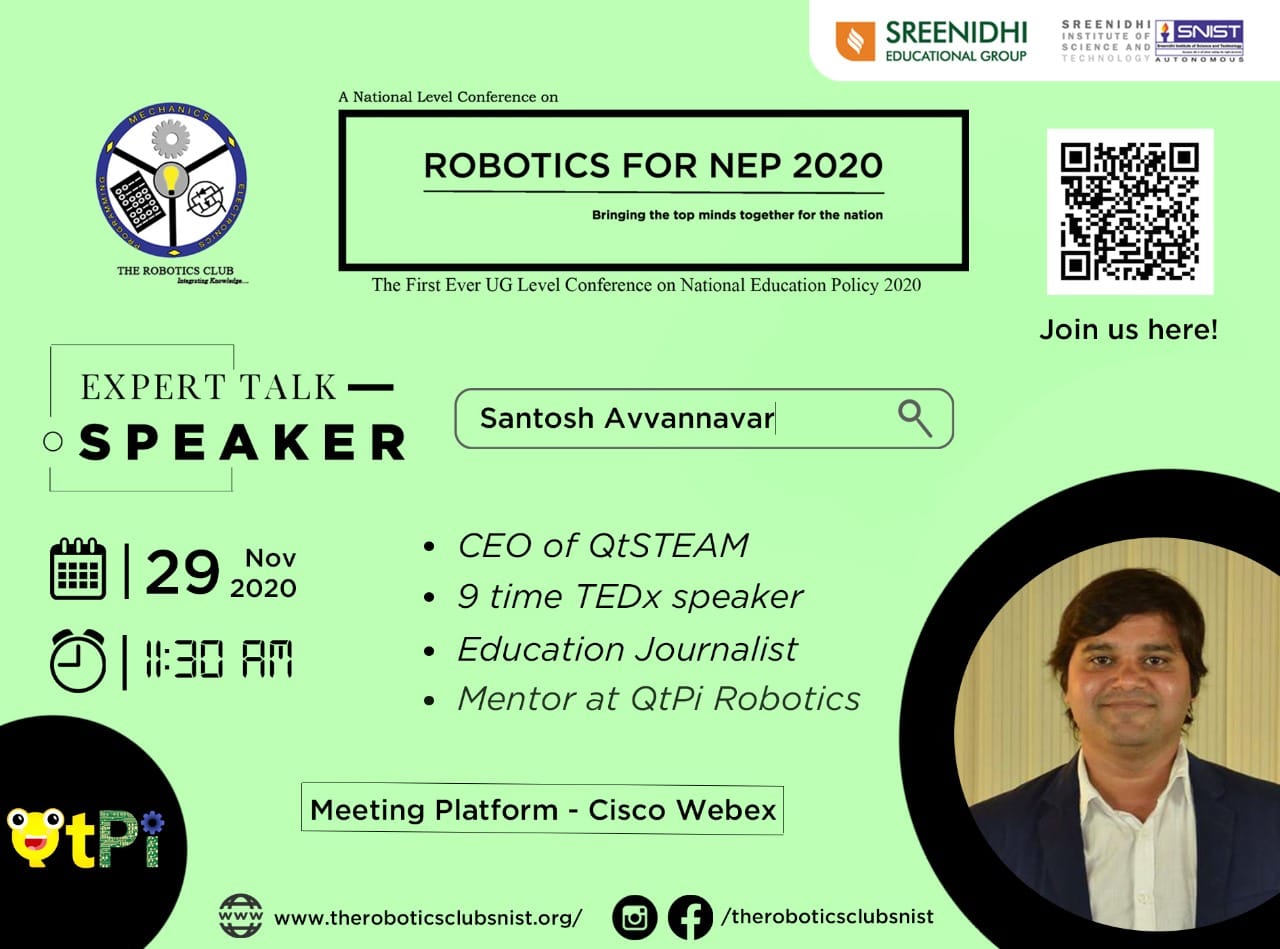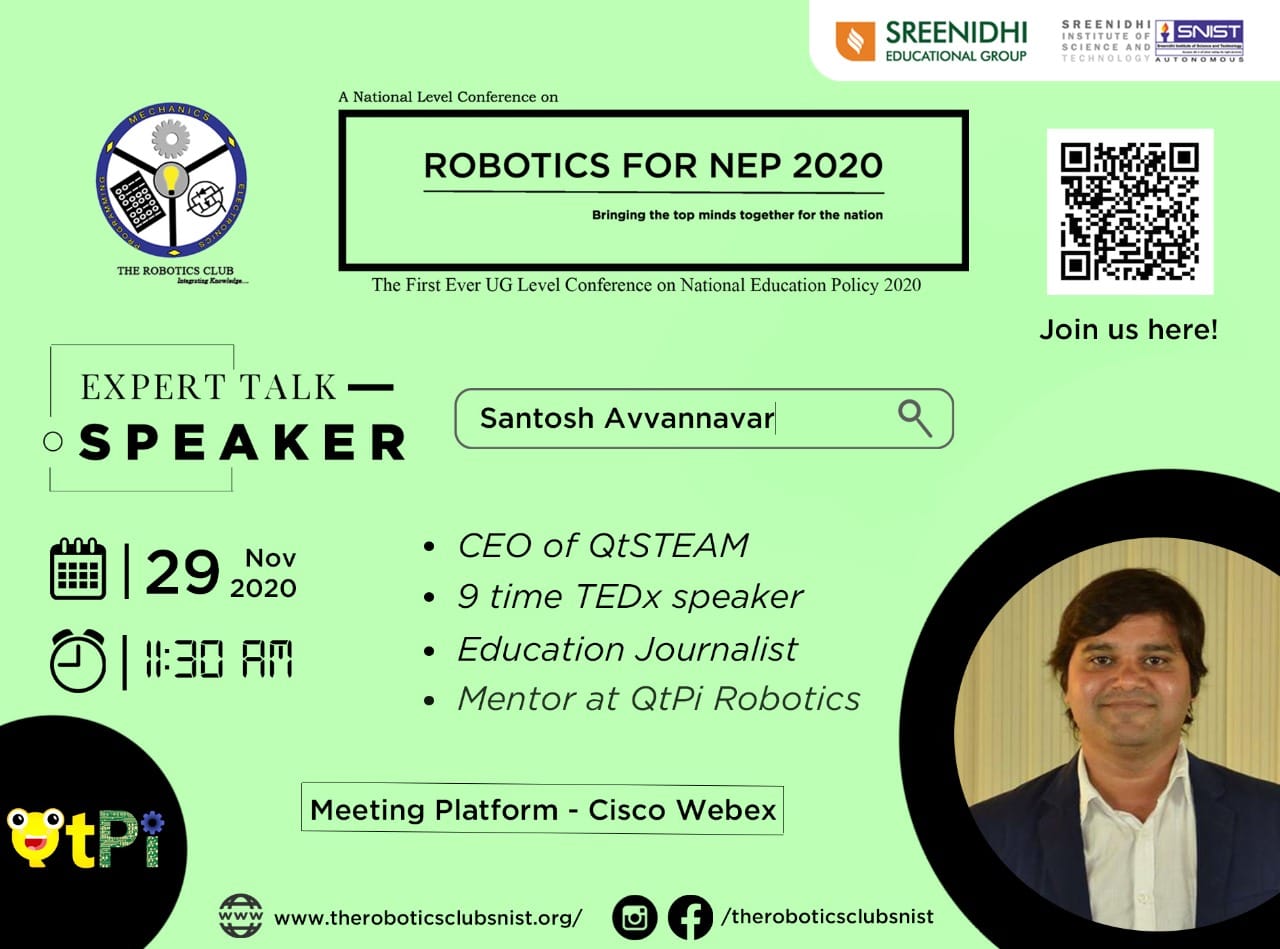
Conversation that took on 29th Nov with participants; organised by The Robotics Club of SNIST
1) What's your opinion on Robotics being taught right from childhood?
I completely don’t believe that an appropriate age is required to learn robotics, and at QtPi robotics are here to debunk it. Early to learn and early to rise in life could be a newer mantra. All interesting visionaries were ahead of time! Aren’t we here to make visionaries? Visionaries who could be thinkers, contributors, educators, problem solvers, policy makers, entrepreneurs and so on. To answer your questions, we have seen children of 2.5 are able to pick terminologies, age 5.5 are able to code for the prototype and QtPi robotics we run from classroom sessions from age 6 onwards. If the question is about self learning we recommend age 9 onwards.
2) In what way, do you think Robotics will nurture young minds?
I think lets start asking questions to answer your question.
What happens if one learns drawing? An imagination gets life.
What happens if one colours the same? An emotional connection.
What happens if I hang it to the wall? It builds confidence by allowing people to admire.
What happens if someone buys it? You do more.
The question is do schools, colleges and homes take a child through all these processes? Maybe very few! But they are limited.
Robotics is one of those amazing areas that is answering all these questions. One could design, pick up electronics and programming, integrate and present it. From here look up a problem and solve it. In all its leading one to become a problem solver. How many of you complain if a question in an examination is out of syllabus? The difference lies there!
3) It is clearly evident that there is a huge gap between industrial requirements and current education. In what way can this gap be neutralised?
A switch of role play is required. Industry people to get involved in academics and educators to get involved in industry. Why do I think its difficult in India? The answer to it is - we are a philosophical and spiritual country - science and psychology yet to become the dominant part of it. The gap isn’t just from schools and colleges but our homes and culture too. How many of you are ready to be without your caste and religion identity in activities you do? Science and Psychology just demands that.
4) What do you think will be the biggest challenge if robotics is included in NEP'20?
I have partially brought out that point in the previous question. Teachers have gone beyond teaching, learners have to go beyond learning. Experienced and inexperienced hands have to work together. The question I have is - why do you want for NEP or any such policy to make a difference? Is thinking has to be based on a document or syllabus?
5) How much will robotic kits cost on an average for a class of 60 students for a complete academic year?
A kit box is nothing more than a book. A book can always be on shelf till it decomposes. The question must have been - why do I have a kit box? Not because its fancy today. Trends will change with a newer name but core remains. However to answer your question, pick a larger objective because solutions are not available. Ideally one kit for every person but while learning they build in teams of 3 or 4.
6) What challenges did you face to differ your company from its competitors?
We are not competing against anyone. We are battling the indifference of people who have no interest in coding and robotics. That’s the challenge and we think NEP is going to help in reducing that difference.
7) What plan would you suggest to implement Robotics in the curriculum?
I would ask - why do you link everything to the curriculum? Link to science, psychology, philosophy and Spiritualism. Linking to the curriculum would become like aiming for marks and certificates. We all know once board exams are over, everything is over! Keep it as open with guidelines for safety as it involves electronic components.
8) According to you, what significant changes can robotics bring in near future, if included in education policy?
Forget for a while the NEP and benefits it could bring. But I think it would help to bring joy, break monotonous classroom life, especially online. For adults it would help you to become a child. The core message is that if fishing is what it takes to feed yourself, go fishing. Don’t expect one to bring changes! I shall leave with a question - what has your college degree brought to you to the future? A possible answer is a job. As you grow in a few years, its going to be memories of friends and working together is going to be part of your life.
9) What teaching techniques would you suggest to teach complex topics like Robotics?
I can only talk from QtPi experience. We follow a methodology though its hard to exercise. We call it a model DESI - Design, Electronics, Software and Integration. I witnessed kids of 6 years onwards where building structures using just six different sized building blocks. These blocks are easy to plug and bring to the dimension of choices. With simplified and kids friendly electronic components (no hanging wires) the challenge of plugging looked simple on the building blocks. In order to make the physical object (robot, not necessarily humanoid) move, kids were doing simple programming that has blocks to drag and drop. I am using the word ‘simple’ to reflect an effective engineering work! The product is inline with the tagline, Plug Play and Innovate. The joy of not building but also witnessing the physical object move is something that must be a best bet for kids! Who had imagined 6 year old kids could do? I think there must be laughing in the heads of several people. They follow a top-bottom approach where kids do most of it by themselves under an observer or a coach.
10) What was your motivation behind establishing a platform for young minds and introducing them to the world of Robotics?
We do several things one time, like study engineering, getting married only once (smiles). Have you ever thought of repeating a subject after passing? Failures are not always about always losing but also not doing beyond your own expectation. Doing one time like CSR activities is getting termed as marketing shtick. One time is no more fun for consumers and this is crucial for EdTech companies though others are not spared. Integration isn’t easy and it frequently needs social and cultural movements. In the last 3 years QtPi has pushed the idea of Integrated model of learning robotics. Where coding is part of robotics. Why integration? The simple answer is - its child’s development cycle. And I strongly believe EdTech companies' development (growth) cycle depends on the child's development cycle. The engagements with children can no longer be like corporate social responsibility (CSR) activities that gets attention for one time .
As I said the model QtPi follows is termed as DESI - This has a correlation to 21st century skills. EdTech have successfully touched upon two 2Cs : Creativity and Critical Thinking but QtPi added other 2Cs: Collaboration and Communication. As children work on ideas and build a prototype always in groups. This would help in collaboration and learning among peers is one of the best bets. By way, don’t get married more than once! If you do, I am not responsible!
11) Can you please list a few qualities which you look for in a fresher during recruitment?
One who is looking for a career over a job.
One who thinks and does solve problems.
One who owns the tasks.
One who is happy in doing it.
One who fears failures and embraces them.
One who ages with time in learning and helping others learn.
One who wants to be a good teacher to create several good teachers.
Education isn’t always a way to look down on other things.
12) Can you suggest any ways Entrance exams can be conducted to pursue Robotics as a stream of study after graduation, keeping in mind the practicality of the course apart from Competitive exams which are already being held in the present system?
Filtration through an entrance test that could make some break but breaks several. This could lead to confusion in one's future! However, mathematically 1/3rd on education, 1/3rd on soft skills and 1/3rd on technical skills. A cumulative score with different weight ages on each section could be a way to look into it. All this done in a language of individual convenience.
